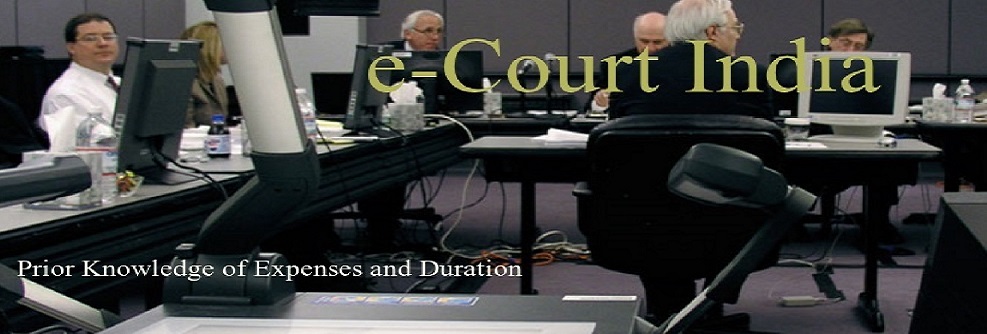With e-Court we do not recognize the concept of 'subsequent' costs. Should you employ a bailiff to enforce the decision by the e-Court arbitrator, then the 'loosing' party must pay the incurred additional expense
No subsequent costs

Corporate Disputes And Online Dispute Resolution In India
source : Geeta Dalal.

Disputes among corporate stakeholders are very common. For obvious reasons corporates prefer to use alternative dispute resolution (ADR) mechanism instead of traditional litigation route. Traditional litigation is time consuming and expansive whereas ADR mechanisms are effective, economical and speedier in nature.
The corporate agreements of these corporate houses essentially contain an arbitration clause and adoption of arbitration proceeding to resolve various future differences and disputes. The commercial division of high courts Bill 2009 also recognises that commercial disputes involving large stakes must be resolved urgently and in an expeditious manner.
Law Minister Veerappa Moily is planning to put before the Parliament of India the Commercial Division of High Courts Bill, 2009 for its approval. This is a crucial piece of legislation as it intends to provide a quick and effective commercial disputes resolution mechanism. The Bill aims at establishing special courts for speedy hearing of commercial disputes of Rs five crores and above.
Commercial disputes require immediate and appropriate dispute resolution to retain faith of business and commercial community in the dispute resolution machinery. India has not been a preferred destination for commercial disputes resolution due to inadequate commercial dispute resolution machinery.
India needs to strengthen its alternative dispute resolution (ADR) mechanism as well as online dispute resolution (ODR) mechanism to inculcate confidence among the business community. Similarly, the Arbitration and Conciliation Act, 1996 must also be suitable amended to incorporate necessary provisions regarding ODR and e-courts.
The present arbitration law of India is not adequate for ad hoc as well as institutionalised arbitration. It is also not effective for international commercial arbitration as well. Moily is planning to bring suitable amendments in the arbitration law of India. With this we can hope that India may get its deserving share of ad hoc and institutionalised arbitration and commercial dispute resolution services.
It is high time for big corporate houses to shift to next dispute resolution revolution known as online dispute resolution (ODR) in India. Companies and individuals must give more stress to ADR and ODR services in India as they are more productive than traditional litigation system of India. In fact, having e-courts and ODR in India can solve almost all the legal problems of companies and individuals in India and world wide.
Information and communication technology (ICT) is considered to be a good option for resolving disputes of modern days. Concepts like online dispute resolution (ODR) and e-courts are proof of the same.
Unfortunately, neither online dispute resolution in India nor e-courts in India has been accepted and implemented. In fact, we have a single techno legal e-courts training and consultancy centre of India and a single online dispute resolution (ODR) centre in India. Further, Perry4Law Techno Legal Base (PTLB) is the sole techno legal ADR and ODR services provider in India.
The scope for online dispute resolution (ODR) services in India in general and techno legal online dispute resolution (ODR) services in India in particular is really good. However, in order to capatilise the same, an early and proper start is necessary.
Online dispute resolution (ODR) and international response is still lukewarm but at least a beginning has been made there. While international online dispute resolution regime has started exploring use of ICT for disputes resolution, online dispute resolution in Asia is still growing. Online dispute resolution in Asian countries is largely confined to a single or two countries that also to a limited extent. Clearly online dispute resolution standards of practice for India and Asia need to be developed urgently.
In fact, techno legal ODR services have become necessary due to growing use of information technology for business and commercial purposes world over. For instance, ODR and cross border e-commerce transactions are also interrelated. Similar is the case regarding dispute resolution of cross border technology transactions.
Dispute resolution in technology transactions is the upcoming trend in the field of ODR. Dispute resolution of cross border technology transactions is a complicated process if we adopt traditional litigation methods to resolve them. Dispute resolution in technology transactions and dealings requires an effective, timely and cost effective mechanism. Traditional litigation is definitely not the place to achieve these objectives.
Obviously, we need an effective alternative to traditional litigation methods to resolve cross border technology transactions and dispute resolutions. Alternative dispute resolution (ADR) mechanisms like arbitration, conciliation, mediation, etc can be used effectively to resolve these technology transactions disputes. For instance, online dispute resolution (ODR) for cross border e-commerce transactions is already been used to resolved small value disputes.
Similarly, legal issues of media and entertainment industry of India have assumed tremendous importance. Entertainment and media industry dispute resolution in India can be resolved using online dispute resolution. Dispute prevention and resolution in the film and media industry in India is presently not exploring use of online dispute resolution.
However, nothing can strengthen ODR more than international efforts and international coordination activities. International legal standards for online dispute resolution (ODR) and international harmonisation of ODR is urgently required.
United Nations can play am important role in international development and international harmonisation of ODR. United Nations and online dispute resolution are closely related in this regard. In fact, UNCITRAL, ODR and India are interconnected and we need an international harmonisation of ODR legal framework as well as suitable policies at the national level. Efforts in this direction have already been undertaken at the international level and very soon we may see some development in this regard.
Alternative dispute resolution in India is well known in India and we need to make efforts in the direction of ODR as well. While doping so we must keep in mind the requirements of privacy laws in India, dispute resolution and ODR. Online commercial arbitration in India also needs to be developed. The sooner these issues are addressed the better it would be for the growth and development of ODR in India.
Electronic courts (e-courts) and online dispute resolution (ODR) are two most important uses of technology for dispute resolution and adjudicating of cases. However, India has been slow on both these fronts. For instance, till the end of February 2012, we are still waiting for the establishment of first e-court in India. This is so because India lacks techno legal expertise for establishment of e-courts.
Perry4Law Techno Legal Base (PTLB) is the exclusive techno legal segment of ICT law firm Perry4Law and it is managing the exclusive techno legal e-courts training and consultancy centre of India. It is clear that establishment of e-courts in India must be expedited.
Similarly, on the front of online dispute resolution (ODR) in India as well, we have performed not well. Although traditional alternative dispute resolution (ADR) services in India have witnessed some growth in India yet ODR is still waiting for a beginning in India. ADR and ODR in India need to be streamlined to give impetus to alternative dispute resolution mechanisms in India. Further, PTLB is the exclusive techno legal ODR services provider in India.
Online dispute resolution (ODR) and international response is still lukewarm but at least a beginning has been made there. While international online dispute resolution regime has started exploring use of ICT for disputes resolution, online dispute resolution in Asia is still growing. Online dispute resolution in Asian countries is largely confined to a single or two countries that also to a limited extent. Clearly online dispute resolution standards of practice for India and Asia need to be developed urgently.
Online commercial arbitration in India also needs to be developed. Similarly, legal issues of media and entertainment industry of India have assumed tremendous importance. Entertainment and media industry dispute resolution in India can be resolved using online dispute resolution. Dispute prevention and resolution in the film and media industry in India is presently not exploring use of online dispute resolution.
Similarly, ODR and cross border e-commerce transactions and dispute resolution of cross border technology transactions are also interrelated. Dispute resolution in technology transactions is the upcoming trend in the field of ODR. Dispute resolution of cross border technology transactions is a complicated process if we adopt traditional litigation methods to resolve them. Dispute resolution in technology transactions and dealings requires an effective, timely and cost effective mechanism. Traditional litigation is definitely not the place to achieve these objectives.
There is an urgent need to adequately use information technology for streamlining the judicial system of India. Presently, the efforts in this regard are not satisfactory at all. Let us hope that by the end of this year; at least the Indian government would start thinking in this direction.
Alternative dispute resolution (ADR) in India has a history of more than 60 years with the Arbitration Act 1940 as one of the initial laws in this regard. The 1940 act was repealed by the Arbitration and Conciliation Act 1996.
This has, however, not produced much change in the ADR law of India. The backlog of civil cases keeps on increasing despite the 1996 Act. This is due to the fact that there are many legal, procedural and fundamental weaknesses in the 1996 Act.
The 1996 Act is in the process of reformulation and there are numerous lacunas that must be removed in the next ADR law of India. The Parliament of India has, however, a serious limitation while formulating ADR laws. It is not much aware of the information and communication technology (ICT) related issues of ADR.
Cyber arbitration is one such aspect. Cyber arbitration is popularly known as online dispute resolution (ODR) mechanism. ODR is a better and improved form of ADR provided India is willing to encash its benefits.
The problem is there are very few ODR institutions in India. Even lesser are ODR experts who can resolve technical, legal and other scientific disputes in an online environment. Even the national litigation policy of India (NLPI) failed to address this issue.
There is no doubt that formulating good techno-legal ODR practices and regulations require tremendous expertise. There are few ODR providers who can assist the Indian government in this regard.
We need to adopt cyber arbitration in India, online arbitration in India and technology arbitration in India. Further, cyber arbitration and mediation centre in India also need to be established. Online commercial arbitration in India also needs to be developed.
Similarly, legal issues of media and entertainment industry of India have assumed tremendous importance. Entertainment and media industry dispute resolution in India can be resolved using online dispute resolution. Dispute prevention and resolution in the film and media industry in India is presently not exploring use of ODR and e-courts.
Similarly, ODR and cross border e-commerce transactions and dispute resolution of cross border technology transactions are also interrelated. Dispute resolution in technology transactions is the upcoming trend in the field of ODR. Dispute resolution of cross border technology transactions is a complicated process if we adopt traditional litigation methods to resolve them. Dispute resolution in technology transactions and dealings requires an effective, timely and cost effective mechanism. Traditional litigation is definitely not the place to achieve these objectives.
Perry4Law and Perry4Law Techno Legal Base (PTLB) suggest that companies and individuals must incorporate suitable “ODR clauses” so that ODR in India can grow. In fact, we are already doing so and are also providing the exclusive techno legal ODR services in India and world wide. We hope very soon ODR and e-courts would be actively used in India for the larger interest of all stakeholders.
Online arbitration in India is at its infancy stage. Online arbitration is also known as cyber arbitration in India. Online arbitration in India is not very popular because there are very few online arbitration and mediation centre in India.
Online arbitration is an essential part of the online dispute resolution (ODR) mechanism. Online dispute resolution in India is still at its initial stages. It is facing many legal and technical roadblocks in India.
Indian arbitration law is incorporated in the arbitration and conciliation act, 1996. With the passage of time, it has become necessary to amend the same. Although much talk about amending the arbitration law of India has already taken place yet no constructive actions have taken so far.
Even the cyber law of India is defective. The information technology act, 2000 is the sole cyber law of India that requires urgent repeal. Further, the national litigation policy of India (NLPI) must also be reformulated as it is not catering the requirements of e-courts and ODR in India.
On the front of research and development as well India need to work hard. We have a single techno legal e-courts training, consultancy and educational centre in India. It is managing many crucial aspects of technology and law like e-courts, ODR, digital evidencing, judges and lawyers training for e-courts and ODR, cyber law trainings, etc. This centre is managed by Perry4Law Techno Legal Base (PTLB), a techno legal segment of Perry4Law.
We need more such techno legal institution that can help in the growth and development of e-courts and ODR in India. Law Minister Veerappa Moily must urgently consider these issues so that online arbitration in India may see the light of the day.
-
TOPICS:
- ABOUT e-COURT
- home
- preliminary information
- introduction ( About us )
- benefits
- scope of legal areas
- directorate
- supervisory board
- advisory council
- originating partners
- e-Court & ADRpartners
- articles of operation
- privacy
- legal information
- in the news
- ( e-Court versus ADR )
- COSTS
- *** introduction
- *** membership
- *** court fee
- *** escrow
- *** hearings costs
- *** attestation costs
- *** extrajudicial costs
- *** legal counsel fees
- *** subsequent costs
- frequently answered questions
- OFFLINE NETWORKING
Endorsements ( 1/2000 + ):
- Patricia M. Swerhone
Waters and Associates, Barristers & Solicitors, Toronto - Kenneth J. Byrne
Immigration and Real Estate Lawyer at Benson Buffett, Newfoundland And Labrador - Amy M. Crosbie
Partner at Curtis, Dawe, Newfoundland And Labrador - Justice Clark
Partner at Simmons Da Silva + Sinton LLP, Toronto - Stanley Potter
Owner, Stanley J. Potter, Barrister & Solicitor, Toronto - Patricia M. Swerhone
Waters and Associates, Barristers & Solicitors, Toronto - Kenneth J. Byrne
Immigration and Real Estate Lawyer at Benson Buffett, Newfoundland And Labrador - Amy M. Crosbie
Partner at Curtis, Dawe, Newfoundland And Labrador - Tony Baker
Toronto, Ontario, Legal Area Law Practice - Justice Clark
Partner at Simmons Da Silva + Sinton LLP, Toronto - Stanley Potter
Owner, Stanley J. Potter, Barrister & Solicitor, Toronto - Beth A. Sheppard
Shareholder/Director, Benson Buffett PLC Inc., Newfoundland And Labrador - Tony Lafazanis
Personal injury lawyer at Tony Lafazanis, Toronto, - Steve A.
Lawyer at Defend Your Points - Traffic Ticket Lawyers, Toronto - Tina Schultz
Owner ~ Broken Link Divorce Planning, Calgary - Joseph W.J. F.
General counsel at Law Office, New Brunswick, Canada - Diana McGuire
Foord and Davies Law Firm, Ottawa - Anushika Anthony
Personal Injury Lawyers, Toronto - James A. Carr
Barrister and Solicitor at Carr Quinn King, Edmonton - Abigail Wiley
TimberWest Forest Corp., Vancouver - Anna L.
University of Ottawa Law School - Miller Thomson LLP
Gerald Chipeur, QC, Partner Calgary, Alberta - Adair
Morse LLP
John Adair, Toronto, Canada Area Law Practice - Bart
Law
Jaqueline Bart, Canadian Immigration Law - Clancy P.C. & Brion Raffoul
Paula Clancy, Managing Attorney at Clancy P.C.& Brion Raffoul, Ottawa Legal Services - Ennis Milne - Barristers & Solicitors
Toronto, Ontario, Law Practice - Partner,
Gilbertson Davis Emerson LLP
Past President, Ontario Bar Association - George A.
Bougadis
Toronto, Ontario, Canada Law Practice - Rick
B
Calgary, Canada Area Industry Law Practice -
Patrick Cormier
Canadian Centre for Court Technology Montreal, Quebec, Canada - Jonathon Baker
Toronto, Canada Area Law Practtration - Nathan Baker
Peterborough, Ontario, Legal Area Law Practice - Tony Baker
Toronto, Ontario, Legal Area Law Practice - Anatoly D
Founder & Partner at D2Law LLP, Toronto - Leo Adler
Osgoode Hall Law School - Steven Bookman
Osgoode Hall Law School - Mark Epstein
Senior Partner, Vancouver, Legal Area Law Practice - Wendy Ponka
CEO, International Institute for Transcribers and Court Reporters, Toronto - Kimberley A. Neeson
President, Court Reporters & Arbitration, Toronto - Michelle Nash
Nash Consulting, Toronto - Silvi Alzetta-Reali
Director of Canadian Initiatives - Durriya B.
Senior Immigration Paralegal, Toronto - David L.
Associate at Dentons Canada LLP, Toronto - Dom C. Bautista
Executive Director at Law Courts Center, Vancouver - Alex A.
Crown Counsel, Toronto - Colin Campbell
Faculty of Law, University of Western Ontario - Gopesh Soni
Barrister, Soni Talwar Patel LLP, Toronto - Christian C.
Barrister, Solicitor & Notary Public, Toronto - James Brown
Brown James H and Associates, Edmonton - Mark Persaud
Senior Counsel at Persaud Law Group, Toronto - Ahab Abdel-Aziz
Partner at Heenan Blaikie, Toronto - Sandra D.
Heenan Blaikie, Toronto - Young Lee
Lawyer, Barrister, Solicitor & Notary Public, Toronto - Bob Ackerman
Owner, Ackerman Law Office Professional Corporation, Toronto - Rosemary Bocska
Research Lawyer at Rosemary Bocska, Research - Darrell Brown
Lawyer at SGM/President at Bezpala Brown Gallery, Toronto - Steven Bellissimo
Partner Chappell Partners, Toronto - Glenroy Bastien
Partner Bastien Barrister & Solicitor, Toronto - Marc Cormier
Partner Cormier Marc & Assoc Avocats-Notaires, New Brunswick - Jannet Allison
Barrister & Solicitor, London Ontario - Leonard,Bosschart
Partner at Fogler Rubinoff LLP, Toronto - Behdad Hosseini
Partner at Hosseini Law Firm (HLF), Toronto - Brooker Law
Partner at Tom Brooker, Ottawa - Joseph Paradiso
Barrister and Solicitor at Paradiso and Associates, Toronto - Mike Stavrakis
Barrister & Solicitor at Mike Stavrakis Law Office, Toronto - Lawrence Blokker
Lawyer at Robinson Blokker, London - Erica Cappello
Barrister and Solicitor at Capo Sgro LLP, Toronto - ( Endorsements continued.....)















